“Blockchain”- A term that’s been thrown around quite often here and there.
Let’s be honest – blockchain isn’t just another trend that’s revolutionizing how things have always been done. The technology behind Bitcoin is changing the game in ways we never imagined.
From revolutionizing royalty distribution to creating new opportunities for fan engagement, this technology is reshaping how we interact with music.
It's not just about security and transparency – it’s about empowering both creators and consumers in ways that were once unimaginable.
Not only that, but Blockchain in music apps is also revolutionizing several other key aspects, which we’ll explore in detail throughout this blog.
So, if you are a music lover or an app developer, buckle up because the impact of Blockchain in music apps is tremendous and you should get going with the trend to be a market-leader.
Overview of Blockchain and the Music Industry
Blockchain technology was initially proposed in 1991 by researchers Stuart Haber and W. Scott Stornetta, who aimed to create a system that would prevent the tampering of document timestamps.
However, it wasn’t until the launch of Bitcoin in January 2009 that blockchain truly came to prominence.
Fast forward to 2025, the market is projected to grow from $44.29 bn in 2025 to $746.41 bn by 2032. The stats clearly shows market is open for new oppurtunities and shows no signs of slowing down.
In the music and blockchain industry, apps like Audius are already benefiting from Blockchain technology to remove the friction of traditional streaming platforms, giving more control to the creators.
Additionally, blockchain ensures that copyrights are better protected, reducing piracy and unauthorized distribution.
For music app developers, integrating blockchain can help create a trustworthy and transparent platform that benefits everyone, making it a go-to solution in one such industry that’s been struggling with leaked tracks and data transparency.
So, why settle for outdated systems when you can create a music app and revolutionise the music industry with a blockchain-backed app?
Technologies Used in Blockchain Music Apps & Their Work
When you’re building a music app with blockchain technology, it’s not just about making things “cool.” It’s about making things work better for everyone – artists, users, and developers alike.
In the music and blockchain industry, several technologies play key roles in making this possible.
These technologies ensure fairer royalty distribution, better copyright protection, and more efficient user interactions.
For example, smart contracts are used to automate payments to artists whenever their music is played. Decentralized storage helps keep data secure, making it nearly impossible for anyone to tamper with music files.
When you start an online music business, these technologies are essential to building a platform that’s trustworthy and user-centric.
|
Technology |
Function |
|
Smart Contracts |
Automate royalty payments, ensuring fair distribution between artists and listeners. |
|
Decentralized Storage |
Keeps music files secure and ensures data is tamper-proof. |
|
Cryptocurrency |
Enables instant payments for artists, eliminating delays or middlemen. |
|
Distributed Ledger |
Tracks transactions, ensuring transparency in royalty and copyright payments. |
|
Tokenization |
Allows fans to buy exclusive content or participate in the artist's success. |
The impact of blockchain in music apps is undeniable. It changes the game for creators, giving them control over their music and fair compensation.
No matter if you’re just starting out or already established, adopting these technologies is important to create a robust and future-ready platform.
Key Benefits of Blockchain in Music Apps
When it comes to music apps, blockchain technology isn't just a buzzword – it's a game-changer. So, what exactly are the benefits of blockchain in music apps? Let’s break it down.
Blockchain in music apps offers a host of advantages, making it a must-have for both artists and users.
From ensuring fair royalty distribution to enhancing data security, blockchain is transforming the way we think about the music industry.
If you're building a blockchain music app, then for users it will be more transparent, and more secure.
Here are some key benefits of blockchain in music apps that you should know about:
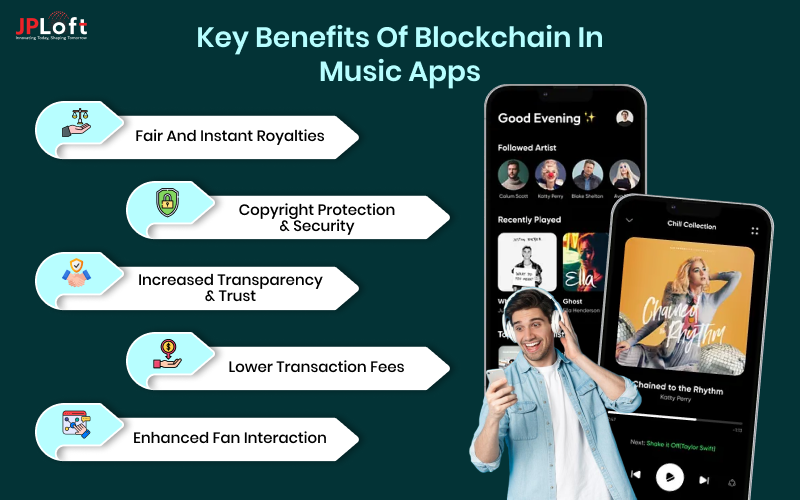
1. Fair and Instant Royalties
One of the biggest benefits of blockchain in music apps is the ability to provide artists with instant royalty payments.
Blockchain cuts out the middleman and ensures that artists are paid fairly every time their music is streamed or sold. No more waiting for streaming platforms to process payments.
2. Copyright Protection and Security
Blockchain ensures that the music app and blockchain technology work together to secure copyright information.
By storing music ownership details on an immutable ledger, it becomes nearly impossible for unauthorized parties to use or distribute the music without permission. This helps protect artists’ rights and reduces piracy.
3. Increased Transparency and Trust
With blockchain and music apps, every transaction is recorded on a public ledger, making it easy to verify royalties, track music rights, and maintain complete transparency. This builds trust with both artists and users, creating a more secure environment for everyone.
4. Lower Transaction Fees
Blockchain removes the need for intermediaries like record labels, streaming platforms, or payment processors, thus significantly reducing transaction fees.
As a result, artists can receive a larger share of the revenue, and music apps can offer users more affordable access to content while keeping the process simple. Music app features such as direct payments or micropayments become more affordable and efficient.
5. Enhanced Fan Interaction
With blockchain, artists can sell exclusive content, such as tokenized tracks, VIP concert tickets, or limited-edition merchandise, directly to their fans.
This helps foster deeper connections and provides new revenue opportunities. By incorporating AI in music apps, you could also personalize these fan experiences, making them more engaging.
Incorporating blockchain into your music app and blockchain technology gives you the power to build a transparent, secure, and artist-centred platform.
The impact of blockchain in music apps is a game-changer; this technology is revolutionizing how music is streamed, sold, and consumed.
Real-World Examples of Blockchain in Music Apps
Blockchain technology is making waves in the music industry, offering game-changing solutions for both artists and fans. But how exactly is it working in real-life music apps?
Let’s take a look at some of the best music apps out there that are already harnessing the power of blockchain to improve transparency, royalty payments, and content ownership.
► Audius
Audius is a decentralized streaming platform that uses blockchain in music apps to allow artists to upload, share, and stream their music independently.
This means no middleman, no delays, and fairer royalties for artists. It’s a great example of how blockchain is transforming the music streaming experience.
► OneOf
OneOf is a platform where users can buy and trade NFTs in the realms of sports, music, and lifestyle.
The platform releases exclusive NFT collections, giving users the opportunity to boost the value of their NFTs by claiming them early.
These collections are organized into tiers within OneOf's marketplace, such as Green, Gold, Platinum, and Diamond. The highest tier, the OneOf One Tier, offers unique NFTs that come with VIP experiences and are available exclusively through auctions.
► MediaChain
MediaChain, now integrated with Spotify, is a blockchain-based peer-to-peer database designed for sharing information across various applications and organizations.
It organizes open-source data by assigning unique identifiers to each piece of information.
Additionally, MediaChain collaborates with artists to ensure fair compensation by issuing smart contracts that outline royalty terms directly with musicians, eliminating the need for complicated third parties or contingencies.
Impact of Blockchain in Music Apps on Users
Blockchain’s influence on music apps goes beyond just technical enhancements – it’s fundamentally changing the way users experience music.
From faster transactions to better content security, blockchain brings a host of exciting benefits. Let’s dive into how it’s making a real impact on users in the music and blockchain industry.
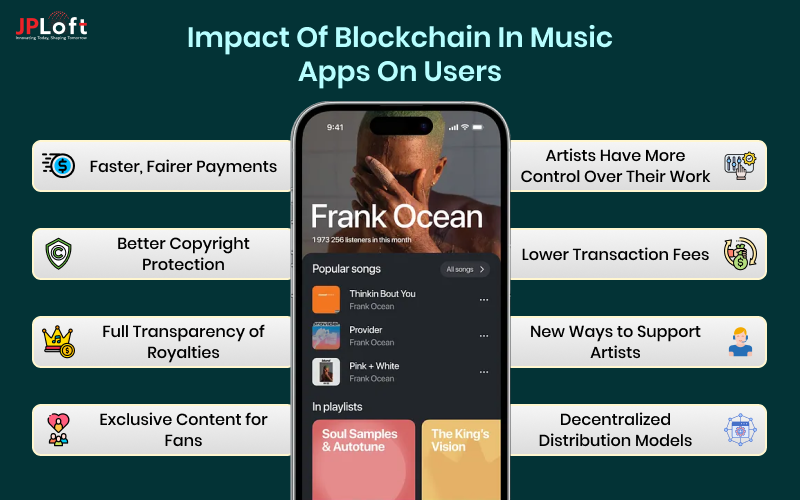
1. Faster, Fairer Payments
One of the key advantages of blockchain in music apps is the speed and transparency of payments.
Unlike traditional streaming platforms that may take weeks to distribute earnings, blockchain ensures instant payments to artists.
Fans and users benefit too, as the platform becomes more efficient, and creators see real-time payments for their work.
The impact of Blockchain in music apps accelerates the whole process, improving the music experience for both the creator and the listener.
2. Better Copyright Protection
Copyright infringement and music piracy are some of the biggest challenges in the music and blockchain industry.
Blockchain provides an immutable ledger for music content, making it impossible for unauthorized parties to alter or steal tracks.
For users, this means the music you listen to is legally protected, and artists can finally get paid for their work.
The impact of Blockchain in music apps strengthens copyright enforcement, which is crucial in today’s digital age.
3. Full Transparency of Royalties
One significant issue with traditional music platforms is the lack of royalty transparency. Fans and artists often have no idea where the money goes once a song is streamed.
With blockchain in music apps, every transaction is recorded on a transparent ledger, making it easier to track how funds are distributed.
This transparency allows users to feel more connected with their favourite artists and reassures them that the music they’re supporting is legally licensed and properly compensated.
4. Exclusive Content for Fans
Blockchain allows music apps to offer exclusive content through NFTs or tokens. Fans can buy tokens that give them access to special content, such as unreleased tracks or VIP experiences.
For example, an artist could release an album as a limited NFT collection, offering early access to fans who purchase a specific token.
With blockchain in music apps, artists can experiment with new ways to engage their community and reward their loyal followers.
5. Artists Have More Control Over Their Work
Traditionally, record labels have controlled how and when an artist’s music is distributed.
With blockchain, artists can upload their work directly to music apps, skipping the middleman and taking full control of their earnings and distribution.
This empowerment not only allows artists to monetize their work better but also gives fans more personalized access to the creators they love.
Blockchain reduces the friction in distribution, allowing artists to grow and evolve without external control.
6. Lower Transaction Fees
Traditional platforms often charge high fees for music distribution, which eats into the earningsof artists. Blockchain reduces these costs by eliminating intermediaries, which lowers transaction fees.
Fans benefit too, as the lower fees make it easier for artists to keep more of their earnings.
Whether you’re an independent artist or a major record label, blockchain in music apps ensures that more money goes directly to the creators you love.
7. New Ways to Support Artists
Blockchain allows fans to support their favourite artists in unique ways, such as by buying tokens or NFTs.
This goes beyond just listening to music – fans can actually own a piece of an artist's future success.
Fans can now invest in an artist’s journey, vote on projects, or even buy exclusive merchandise linked to their favourite tracks.
With the integration of Blockchain in music apps, fans can actively participate in the creative process and help shape the direction of the music they love.
8. Decentralized Distribution Models
Blockchain enables a more decentralized approach to music distribution, removing the need for intermediaries.
Artists can upload and distribute their tracks directly to users, cutting out traditional music distributors or streaming platforms.
For users, this means a wider variety of music to explore. It also allows independent artists to reach a global audience without needing to rely on traditional platforms or labels.
By using blockchain in music apps, creators can build their own ecosystem, putting the power back in the hands of the artists and their fans.
Incorporating blockchain in music apps not only solves long-standing issues like piracy and royalty transparency, but it also offers a more empowered and efficient way for fans to interact with music.
Be it faster payments, exclusive content, or a direct connection with the artist, blockchain technology is changing how we experience music today.
With this, it must be clear that the impact of blockchain in music apps is huge, now time to take a look at the challenges and implementation of Blockchain in Music apps.
Challenges and Limitations of Blockchain in Music Apps
While blockchain in music apps has the potential to transform the industry, it also brings several challenges and limitations that need to be addressed.
As music and blockchain evolve together, the road to widespread adoption faces some obstacles. Let’s take a closer look at these challenges:
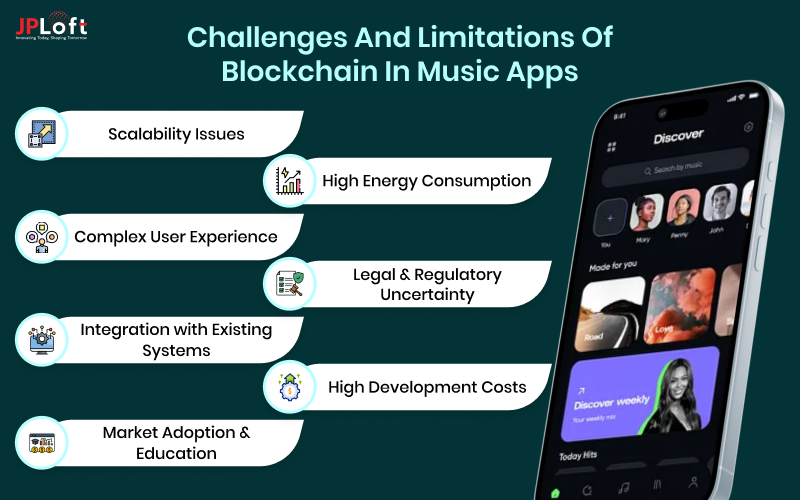
1] Scalability Issues
Challenge: Blockchain networks can struggle with scalability. As music apps grow and more transactions occur, processing speeds slow down, and transaction costs rise.
Solution: To address this, music and blockchain solutions are exploring layer-2 scaling technologies like sidechains and sharding to handle larger volumes without sacrificing efficiency or cost-effectiveness.
2] High Energy Consumption
Challenge: Blockchain’s Proof of Work consensus mechanism requires massive computational power, resulting in high energy consumption, which raises concerns about sustainability.
Solution: Transitioning to energy-efficient alternatives like Proof of Stake can mitigate the environmental impact, allowing blockchain in music apps to thrive while minimizing their carbon footprint.
3] Complex User Experience
Challenge: Blockchain technology is complicated for the average user. Managing wallets, private keys, and tokens can be a barrier for artists and fans.
Solution: Simplifying the user interface and experience in music apps and blockchain integration will make it easier for users to access and use blockchain features without technical know-how.
4] Legal and Regulatory Uncertainty
Challenge: The legal landscape surrounding blockchain in music apps is still evolving, especially around copyright laws, royalties, and distribution rights. Without proper regulation, the legal challenges of music apps can limit the technology’s potential to disrupt the industry.
Solution: Clearer music and blockchain regulations are essential. The industry needs standardized contracts and clearer guidelines to ensure creators' rights and ensure smooth adoption of blockchain-powered platforms.
5] Integration with Existing Systems
Challenge: Integrating blockchain with existing music app infrastructures, which are often centralized, can be complex and costly.
Solution: Using hybrid blockchain models that combine centralized and decentralized features can ease the integration, making it easier for platforms to adopt blockchain technology in music apps without disrupting existing operations.
6] High Development Costs
Challenge: The cost to create a music app with blockchain integration can be significantly higher than traditional development, setting up smart contracts and token economies requires substantial upfront investment, making it difficult for smaller developers.
Solution: To reduce costs, open-source blockchain solutions and affordable blockchain-as-a-service platforms are emerging, making it easier for developers to create and scale their music apps with blockchain capabilities.
7] Market Adoption and Education
Challenge: Blockchain is still a relatively unknown technology for many users and artists, which slows its adoption in the music and blockchain space.
Solution: Increased education and outreach, along with user-friendly tools, will help demystify blockchain. Apps that simplify the learning curve will pave the way for wider adoption and ensure that blockchain in music apps becomes mainstream.
In the next section, we’ll explore how emerging trends are addressing these issues and driving the adoption of blockchain technology in music apps.
The Future of Blockchain in Music Apps
Blockchain is set to transform the music industry. With decentralized platforms and AR/VR in music apps, the opportunities are endless.
As blockchain in music apps continues to evolve, artists gain more control over their content. At the same time, fans can enjoy increased transparency and access to unique experiences.
Let’s dive into the trends in music apps that are shaping the future of the music and blockchain industry.
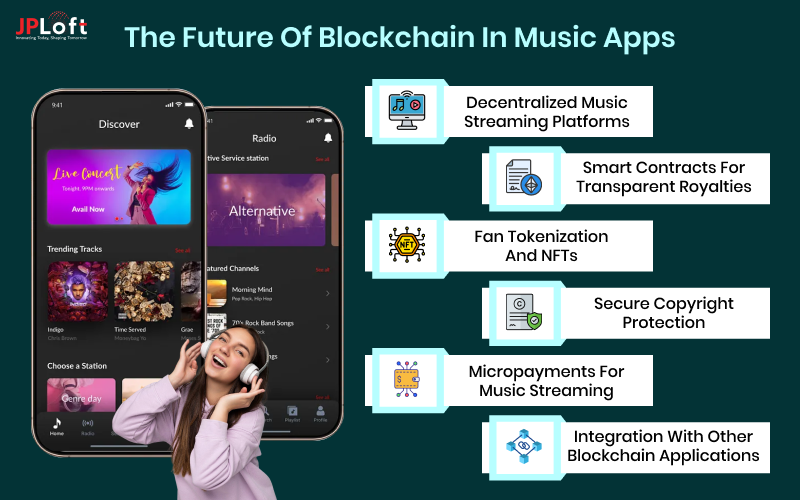
1. Decentralized Music Streaming Platforms
Decentralized platforms like Audius are empowering artists to keep ownership of their music.
By removing intermediaries, artists earn more, while listeners enjoy a more direct relationship with creators.
The role of blockchain in music apps is crucial in promoting fairness and transparency.
2. Smart Contracts for Transparent Royalties
Blockchain enables smart contracts that ensure artists get paid immediately whenever their music is played.
This technology ensures royalty payments are fair, transparent, and automated, improving the overall use of blockchain in music for royalty distribution.
3. Fan Tokenization and NFTs
Artists can now create fan tokens or NFTs to offer exclusive content, experiences, and merchandise. This new way of monetizing directly connects fans and creators.
The impact of blockchain in music apps is seen in how it brings fans closer to their favorite artists while benefiting creators.
4. Secure Copyright Protection
Blockchain provides a secure, transparent way to protect copyrights and prevent piracy.
Artists can register their music ownership on the blockchain, which ensures that they retain control over their work.
The implementation of blockchain technology in music apps makes this protection more efficient.
5. Micropayments for Music Streaming
Blockchain allows for micropayments, enabling listeners to pay small amounts for individual songs or streams.
This model ensures that artists earn from every play, providing a direct and fair payment system. It’s revolutionizing how music apps generate revenue and compensate artists.
6. Integration with Other Blockchain Applications
The music and blockchain industry is starting to integrate with other blockchain-based applications, such as decentralized finance (DeFi) and gaming platforms.
This synergy will allow musicians to explore new revenue streams and expand their audience base, all while maintaining control over their intellectual property.
How JPLoft Can Help You Integrate Blockchain in Music Apps?
Ready to take your music app to the next level with blockchain technology?
At JPLoft, we specialize in turning innovative ideas into reality, offering end-to-end solutions to seamlessly integrate blockchain in music apps.
If you want to decentralize your platform, safeguard copyrights, or integrate micropayments, our expert team is ready to craft a robust, scalable app tailored precisely to your needs.
With our vast experience in app development, we ensure your music app not only stays ahead of the trends but also provides users with a transparent, secure, and engaging experience.
Trust JPLoft, the best music app development company, to bring your blockchain-powered music app vision to life.
Conclusion
The impact of blockchain on music apps is truly transformative, offering unprecedented opportunities for both artists and consumers.
By decentralizing music distribution, blockchain ensures that creators retain control over their work, promoting transparency and fair compensation.
Smart contracts and tokenization pave the way for direct transactions, reducing reliance on intermediaries.
As blockchain technology evolves, it will continue to shape the future of the music industry, providing enhanced security, royalties management, and user experiences.
The continued adoption of blockchain in music apps promises to redefine how music is consumed, shared, and monetized, benefiting all stakeholders in the ecosystem.
FAQs
Blockchain empowers artists by ensuring they receive fair compensation directly for their work through transparent, tamper-proof transactions.
Yes, blockchain’s decentralized nature makes it harder for unauthorized copies to circulate, offering better copyright protection and secure distribution.
Smart contracts automate royalty payments, ensuring creators and other stakeholders get paid instantly and accurately when their content is used.
Several platforms, such as Audius and Ujo Music, are already integrating blockchain to decentralize music distribution and enhance artist revenue streams.
While blockchain offers numerous benefits, challenges include adoption barriers, technological integration, and regulatory concerns that need to be addressed for widespread success.






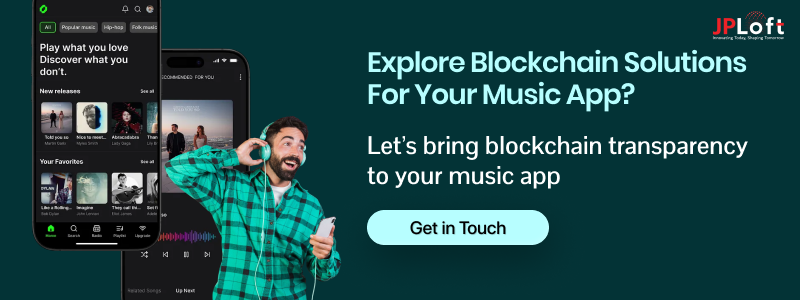

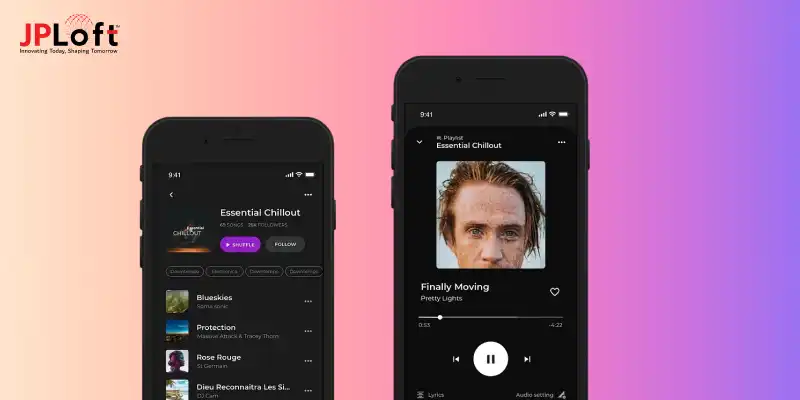
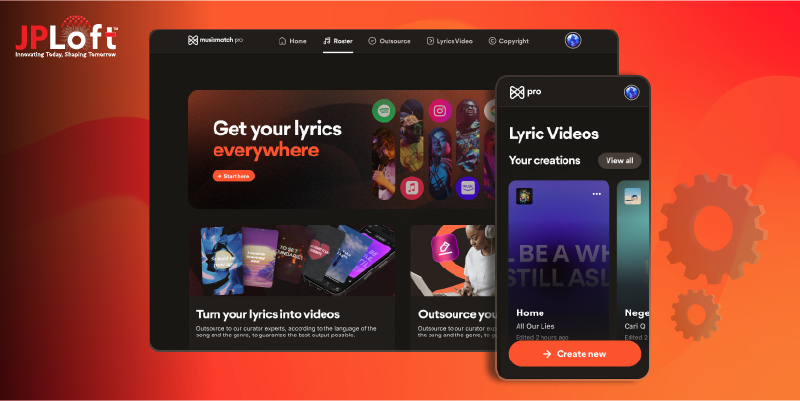



Share this blog